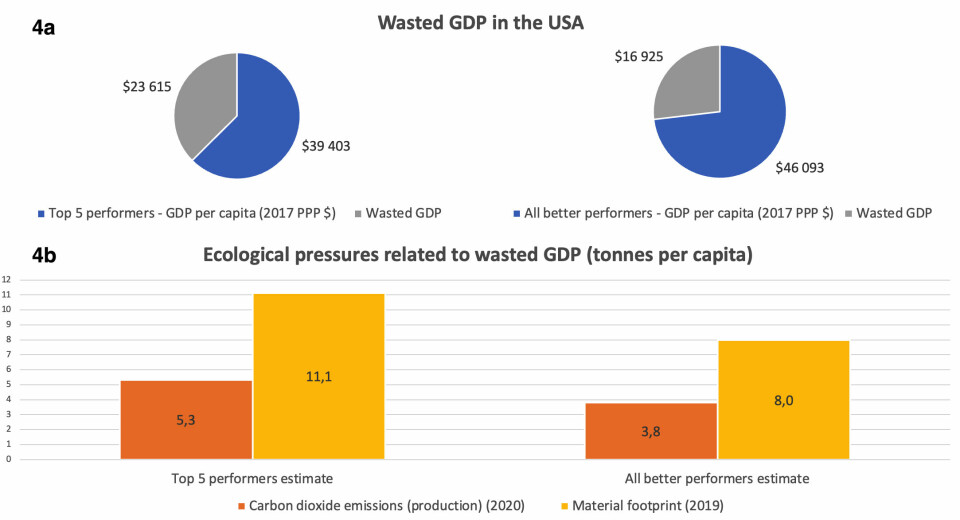Share your science:

A large Gross Domestic Product doesn’t necessarily lead to better lives
SHARE YOUR SCIENCE: More than 20 countries perform better than the USA on the Human Development Index (HDI). If money can buy happiness, the economic resources of the USA are clearly not spent well.
Gross Domestic Product (GDP) measures the value of a country's economic activity. For a long time, GDP growth has been a dominant policy goal internationally. One reason for this is that politicians have assumed that GDP growth results in better lives.
However, many have started questioning whether GDP growth is sound in today´s world. Particularly, there are reasons to question whether further GDP growth in the richest countries is sound. Several scholars have called for moving beyond GDP as a measure of welfare. Critics point to developments in the quality of life and well-being and to the environmental damage caused by economic activity.
The decline of the USA
The article “Wasted GDP in the USA” examines the connection between the size of the GDP of the USA and how well the USA does. Specifically, it examines how well the USA performs on the Human Development Index (HDI). This is an index that is calculated by the United Nations Development Programme (UNDP), which is a part of the United Nations (UN).
If the USA adopts policies more focused on promoting human welfare, this would lead to improvements in quality of life and well-being.
The USA has the biggest economy in the world. If we look at the average income per person, it is also the richest country with a large population. Since many think that a large GDP results in better lives, we might expect that the USA has done very well on the Human Development Index.
But since the UN started publishing annual updates of the Human Development Index in 1990, the USA has been sliding down the list. By 2010, in the aftermath of the global financial crisis, the USA was no longer among the world´s 10 most developed countries. By 2021, the USA was no longer among the world´s 20 most developed countries.
Income, education, and health
The Human Development Index is comprised of three so-called dimensions – an income dimension, an education dimension, and a health dimension. To do well on the Human Development Index, a country needs to perform well in all three dimensions. If we look more closely at the USA´s performance, a mixed picture emerges.
What matters to the income dimension is GDP per person. This is the same as income per person. US income per person has shown an impressive growth since 1990. In 2021, each US citizen had an average income of 64.765 US dollars. But this does not necessarily mean that most US citizens have good lives.
One reason for this is that income is unevenly distributed. The average income increases when most people get increased income. But average income can also increase when only the richest in the country get increased income.
Two numbers matter in the second dimension of the Human Development Index, the education dimension. The first is the number of years, on average, that an adult US citizen has been in school. By this measure, the USA is at number 5 in the world. The average US citizen has spent more time in school than people in most other countries.
The second number that matters in the education dimension is the number of years, on average, a child is expected to be in school. By this measure, the USA is at number 31 in the world. In countries such as Australia, Greece, and Sweden, children are expected to be at least 3 more years in school than in the USA.
Now, let´s turn to the third and final dimension of the Human Development Index, the health dimension. What matters here is life expectancy. In the USA, life expectancy is only about 77 years. That is not impressive for such a rich country. The USA is only number 45 in the world by this measure.
In Japan and Australia, people live 7 years longer on average. The average person in OECD countries, a club of mostly rich countries, lives longer than the average US citizen. So does the average Chinese citizen, even though their income is much lower.
Wasted GDP and lost opportunities
The USA´s problem is that even though the average income of its citizens is large and increasing, this does not result in better lives. There must be something wrong with how the economic resources of the USA are used. Several countries do better than the USA on the Human Development Index, even with a lower income. Of the 26 countries that do better than the USA, 21 countries have a lower GDP per person.

In my research, I consider GDP as wasted if it does not support welfare. By comparing how well the USA does on the Human Development Index with better-performing countries, we can estimate the portion of the GDP of the USA that is wasted. This implies comparing the USA to the 21 countries that do better than the USA while having a lower income. On average, these countries have a GDP per person that is 26.9 per cent lower than in the USA.
The top 5 performers – Greece, Spain, Slovenia, Japan, and Cyprus – have an income that is 37.5 per cent lower than in the USA. This means that we can consider between 26.9 per cent and 37.5 per cent of the GDP of the USA as wasted. The USA could have had a substantially lower income than today, and still perform better in education and health than it does today.
Damage to the environment
I have now estimated what portion of the GDP of the USA that is wasted by not supporting welfare. We can also say something about the environmental damage caused by wasted GDP. This amounts to between between 1.268 and 1.767 million tonnes of carbon dioxide emissions, and a material footprint of between 2.625 and 3.659 million tons.
If no GDP had been wasted in the USA, global carbon dioxide emissions could be reduced by up to 5 per cent. And the global material footprint of humankind could have been reduced by up to 3.8 per cent.
If the USA adopts policies more focused on promoting human welfare, this would lead to improvements in quality of life and well-being. It could also save the planet from substantial amounts of environmental damage.
(The article “Wasted GDP in the USA” was recently published in the Springer Nature journal Humanities & Social Sciences Communications)
Share your science or have an opinion in the Researchers' zone
The ScienceNorway Researchers' zone consists of opinions, blogs and popular science pieces written by researchers and scientists from or based in Norway.
Want to contribute? Send us an email!





























